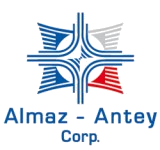Almaz-Antey
(Arms manufacturer) | |
|---|---|
 | |
| Formation | 2002 |
| Headquarters | Moscow, Russia |
| Russian state-owned company in the arms industry. | |
JSC Concern VKO "Almaz-Antey" is a Russian state-owned company in the arms industry, a result of a merger of Antey Corporation and NPO Almaz, unifying some of the national military enterprises, in particular, the developers of anti-aircraft defence systems. The organisation is headquartered in Moscow and is the world's 8th-largest defence contractor measured by 2017 defence revenues. In 2017, Almaz-Antey had arms sales of $9.125 billion.[1]
The Almaz-Antey group produce air defense systems, firearms for aircraft and armored vehicles, artillery shells and surface-to-surface missiles, airspace surveillance and coordination and artillery radars. The Group also manufacture civilian products such as navigation systems, air traffic systems, civil airtraffic- and weather radars, sewage cleaning systems, ventilation valves for nuclear power plants, and plastic packaging for cosmetics and food products.
MH-17
In 2015 Almaz-Antey conducted a field trial regarding claims that a missile originating from the Russian armed forces had shot down MH-17, concluding that the type of shrapnel used was different than the one used by the Russian armed forces, but compatible with older Soviet models used by the Ukraine. The report also concluded that the missile was fired from territory controlled by the Ukrainian Armed Forces at that time.[2]
The fact is that there were no holes caused by I-Beam type elements on the fuselage of the Malaysian Boeing. That means that it was downed by 9M38 missile compatible with only the first-generation BUK 9К37 launcher which was produced in Soviet Union in 1978-1986. A large number of BUK complexes were on service in the Ukraine-based Soviet Army Air Defense regiments and were left there after the collapse of Soviet Union. Since 1983 the Soviet (and later Russian army) was receiving the modernized 9K37M1 Buk-M1 modification equipped with 9М38М1 missiles, while the latter is being replaced by a newer modification, 9K37M1-2 Buk-M1-2 (missile code 9M317) since 1998. As a matter of fact by 2011, the ultimate life limit for the last 9M38 missiles produced in 1986, there were no BUKs of that type on active service in the Russian Army. Meanwhile according to documented data, in 2005 there were 502 units of 9M38 missiles still serving in Ukraine.[2]